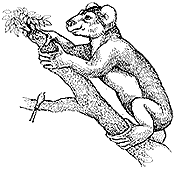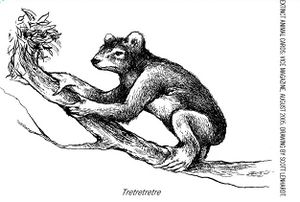Tretretretre: Difference between revisions
No edit summary |
No edit summary |
||
| Line 15: | Line 15: | ||
*Species: Megaladapis edwardsi | *Species: Megaladapis edwardsi | ||
**Megaladapis is the genus of three extinct species of primates that once inhabited the island of Madagascar ([http://www.primates.com/primate/megaladapidae.html link]) | **Megaladapis is the genus of three extinct species of primates that once inhabited the island of Madagascar ([http://www.primates.com/primate/megaladapidae.html link]) | ||
*Learn more about lemurs of Madagascar! ([http://sciencebulletins.amnh.org/bio/f/lemurs.20060401/essays/82_2.php link]) | |||
<blockquote> | |||
The giant lemur Megaladapis edwardsi was one of the largest of the so-called subfossil lemurs. It weighed between 100 and 200 pounds and was the size of a small adult human. Among its most distinctive features was its muzzle: long and extremely robust, it evidently supported a large, fleshy nose or proboscis (a lemur with a trunk, perhaps?). This and related species of Megaladapis are common in subfossil sites along the western shore of Madagascar, as well as the interior. Recent radiocarbon dates establish that this lemur was still living around the time of European discovery of Madagascar (AD 1504). The lemur's common name, if correctly attributed, relates to a Malagasy oral tradition of the "tretretretre," an animal the size of a calf with a humanoid face.<br /> | |||
<br /> | |||
<i>"The tretretretre is a large animal, like a calf of two years, with a round head and the face of a man. The forefeet are like those of an ape, as are the hindfeet. It has curly hair, a short tail, and ears like a man's...It is a very solitary animal; the people of the country hold it in great fear and flee from it, as it does from them."</i><br /> | |||
<br /> | |||
(From observations on the natural history of Madagascar recorded by the French explorer Etienne Flacourt in 1661.)</blockquote> | |||
Revision as of 15:41, 15 May 2006
General
- The tretretretre is a ledgendary half man/half lemur on the island of Madagascar. It was also said to be a dog/human/monkey-faced lemur with monkey paws, and was the size of a 2 year old calf.
- It is often believed that Malagasy legends of the tretretretre refer to the Megaladapis (an extinct giant lemur), but the details of these tales, notably the "human-like" face of the animal, match the related Palaeopropithecus (extinct) much better
- Perplex City has tretretretres in their zoo, leading to the tretretretre developing a large following among Earth-based Cube hunters
- Kurt has also stated that his favorite animal is the tretretretre (link)
Encyclopaedic entry
- Sub-class: Placentalia
- Order: Primates
- Family: Lemuridae (Lemurs)
- Species: Megaladapis edwardsi
- Megaladapis is the genus of three extinct species of primates that once inhabited the island of Madagascar (link)
- Learn more about lemurs of Madagascar! (link)
The giant lemur Megaladapis edwardsi was one of the largest of the so-called subfossil lemurs. It weighed between 100 and 200 pounds and was the size of a small adult human. Among its most distinctive features was its muzzle: long and extremely robust, it evidently supported a large, fleshy nose or proboscis (a lemur with a trunk, perhaps?). This and related species of Megaladapis are common in subfossil sites along the western shore of Madagascar, as well as the interior. Recent radiocarbon dates establish that this lemur was still living around the time of European discovery of Madagascar (AD 1504). The lemur's common name, if correctly attributed, relates to a Malagasy oral tradition of the "tretretretre," an animal the size of a calf with a humanoid face.
"The tretretretre is a large animal, like a calf of two years, with a round head and the face of a man. The forefeet are like those of an ape, as are the hindfeet. It has curly hair, a short tail, and ears like a man's...It is a very solitary animal; the people of the country hold it in great fear and flee from it, as it does from them."
(From observations on the natural history of Madagascar recorded by the French explorer Etienne Flacourt in 1661.)
Wordplay
- The word "tretretretre" contains repetitive identically spelled syllables and is often cited in lists of these "repeaters" (link)
References
- Perplex City Map
- Perplex City Zoo (link)
- Oistin Meade's survey
- Perplex City Police incident report
- [18:54] MB: Vehicle crashed into wall of zoo, multiple tretretretres escaped
- [19:28] RLW: Tretretretre spotted in Taversen Square
- Kurt's blog, The Path of Least Time
- 25-APR-06, "Oistin and Von" (link)

